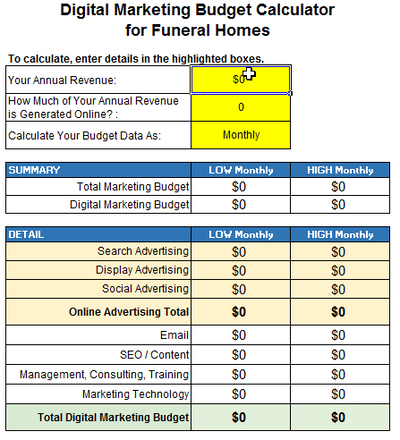When a death happens, people are scrambling for answers.
Your funeral home could be the go-to resource for guidance. You see, by answering questions that people ask, you have a great chance of ranking on Google. When someone dies, they have to write an obituary. Why not supply a template for that? If you post regularly, you can actually start to get calls as a result of your information. And that doesn't cost you anything.
Sometimes you can make these guides “gated content” which means that in order for someone to download the complete guide, they’d need to disclose some contact information.
One really good place for these is on your obituary page. In our experience that is a very popular page and would get a lot of visibility.
You can “repurpose” the blog content by making pdf documents that funeral directors can email or hand out to families. As you well know, grieving family members are not always on the top of their game when a death happens so offering guides in writing after you have spoken with families helps them and makes your job easier.
Many websites these days have a blog. Sometimes all you need to do is activate it, and start blogging as a part of your funeral home marketing strategy.
Blogging steps
- Brainstorm ideas. Start with common customer questions and answer them.
- Write a blog post and add a call to action at the end. A downloadable document, a link to a contact form or your phone number
- Once you post it on your website, share the article on Facebook. It helps with SEO (search engine optimization)
- On Facebook, you can "boost" your blog posts for not a lot of money. $10-$20 will help build your following and people will appreciate that you took the time to help them in a time of need
Sample blog post topics for funeral homes
-
How to plan a memorial service
For this, you’d want to offer templates and pdf files of bulletins of other memorial events. This gives the bereaved something to start with and sets expectations.
-
Tips on buying an urn for every budget
People will often invest in all kinds of containers that certain cemeteries do not accept. Before consumers waste money, a blog post on tips for choosing one or making sure consumers ask the right questions when asking at cemeteries would be beneficial. Include that some cemeteries are particular and have rules for the burial of certain objects.
-
How to buy a headstone
The process of getting a headstone locally can also be confusing as there are often multiple vendors involved. Step-by-step instructions of how it works in a downloadable guide could help you even after you have discussed those steps in person. It gives them something to refer to after they leave.
-
How to write an obituary
For this one, you would offer some templates. Maybe you have three. One for traditional. One a little bit less traditional and one that discloses more. There are many examples online but giving someone a downloadable word document is helpful to those in grief.
-
Typical scams on the bereaved
- Robbing the house of the bereaved during the funeral/memorial service. If you’ve published an obituary and the time of services, a friend of the family should make sure someone is at the address at the time of services as crooks will read the obituaries and rob homes where no one is home. Your customers should know this so they can plan for it.
- Identity theft. The identity theft of a deceased person is called ghosting. It’s a form of identity theft in which someone steals the identity of a specific dead person or ‘ghost’. Parents who recently lost a child are increasingly targeted by these thieves, experts say. Armed with the deceased child’s Social Security number and other personal information, the crooks falsely claim them as dependents and have the refunds routed to them.
If you start to write content on your website, you can earn considerable authority on Google search pages simply by answering common customer questions on your blog.






Agree, disagree, or just have something to add?
Leave a comment below.